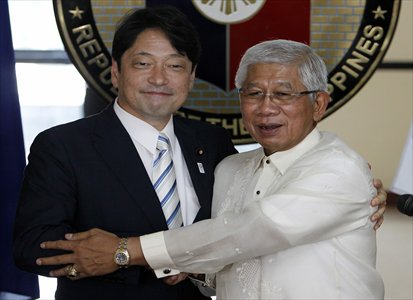Uncertain alliances

Visiting Japanese Defense Minister Itsunori Onodera (left) and his Philippine counterpart, Voltaire Gazmin, pose inside a military camp in Quezon city, northeast of Manila on June 27. Photo: CFP
In front of a monument in Manila commemorating the atrocities in which over 100,000 Filipinos were slaughtered in 1945, a Philippine teacher describes the period to her students. "This is a history that we shall never forget," she tells them.
But while historical memories linger in the Philippines, the relationship between Japan and the islands has been rapidly improving.
In Tokyo, 3000 kilometers away, Philippine Foreign Secretary Albert del Rosario and Japanese Foreign Minister Fumio Kishidan agreed after a meeting in late May that Japan will provide patrol boats to the Philippines and work together to improve the capabilities of the Philippine Coast Guard.
And in a meeting between Rosario and Japanese Prime Minister Shinzo Abe, Abe said Japan backs Manila's initiation of arbitral proceedings of the United Nations Convention on the Law of the Sea (UNCLOS) in its island dispute with China in the South China Sea.
Island disputes
It is easy for people to associate Rosario's visit to Japan and Tokyo and Manila's agreement for closer maritime cooperation with their sea disputes with China, Lauro L. Baja, Jr. former Philippine permanent representative to the UN, and a former Philippine undersecretary of foreign affairs, told the Global Times. Both countries have prominent island disputes with China.
Baja said the Philippines believes that in its confrontation with China, it needs as many allies as possible. Japan might be able to give as many as 10 patrol boats to the Philippines, which was even more generous than the US, he noted.
"Japan fails to keep an objective attitude on China's rise and rapid economic development, regarding China as a potential threat. And it wants to use China's dispute with the Philippines to forge an alliance against China," said Professor Huang Dahui, dean of the Department of Diplomacy and director of the Center for East Asian Studies at the Renmin University of China.
Such a strategy might work in the short term, as some neighboring countries are still skeptical of China's intent, but it would be different in the long run with China's increasing political and economic influence, he said.
Japan is also considering maritime cooperation with Vietnam, which is also involved in disputes with China in the South China Sea.
Economic closeness
On the economic and trade front, Tokyo and Manila are also seeking closer cooperation in an effort to offset China's growing economic clout.
The Japan-Philippines Economic Partnership Agreement is the first and only bilateral free trade agreement Manila has signed with other countries. Japan is the Philippines' largest trade partner and the biggest investor in the country. Tokyo is also the biggest donor to Manila and the third largest tourist market for the Philippines.
Manila hopes Japanese firms could shift some of their industries in China to the Philippines, which has a relatively cheap labor force, analysts said.
In a sign of Japan's economic influence in the Philippines, over 90 percent of cars in Manila streets are Japanese brands.
But Michael P. Balahibo, a sales manager at Mitsubishi Motors in Manila, told the Global Times that the majority of their vehicles sold in the Philippines were imported from Japan and Thailand.
"If we could establish production factories here, we could save tariffs and transportation fees, but the tax rate in the Philippines is relatively high. This will be an issue for automotive enterprises," Balahibo said.
Kelvin L. Lim, a Chinese-Filipino trader of building materials who owns several factories in Shanghai, told the Global Times that shifting factories from China to the Philippines would not be that easy for Japanese firms.
"Philippine labor is relatively cheap, but it is difficult to find skilled workers here and it is also very hard for companies to get land to build factories. Also the infrastructure is not very good," Lim said. "That's why I chose China over the Philippines to build my factory."
Bad memories
Carlos V, a Philippine tourist guide, told the Global Times the bitter World War II history between the Philippines and Japan made some Filipinos still doubtful when dealing with Japanese, especially when they hear extreme remarks by Japanese politicians.
Osaka Mayor Toru Hashimoto, a Japanese nationalist has said that Japan's wartime practice of forcing Asian women, including Filipinos, to work in brothels was necessary to maintain discipline and provide relaxation for soldiers.
A Philippine tourist surnamed Zuri told the Global Times that Hashimoto's remarks were shameful. "We feel embarrassed at his comments, which were extremely disrespectful of those women and that period of history," she said.